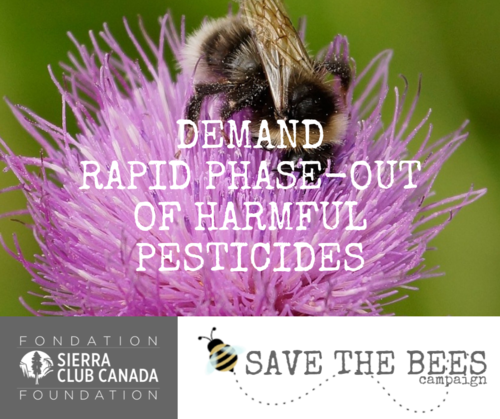
Sierra Club Canada Foundation welcomed Health Canada’s ban of two dangerous neonicotinoid pesticides, announced in August 2018, but we seek a process that allows for a more rapid phase-out than the proposed three to five-year timeline.
After years of research and policy discussion, Health Canada is still allowing use of these pesticides outdoors for another 3 to 5 years. Meanwhile, bee species are in rapid decline.
We also need reform of the Pest Management Regulatory Agency (PMRA) process for listing chemicals like neonics. Currently we have a system that allows 1) the destructive chemicals like clothianidin, thiamethoxam and imidacloprid to be approved in the first place and 2) the continued use of chemicals that are well-documented as damaging, while policy lags behind.
Meanwhile, ongoing research must take place into impacts on aquatic life and pollinators. Health Canada has announced a phase out of the most common neonicotinoids, clothianidin and thiamethoxam, but a distinctly similar neonicotinoid, imidacloprid, has been delayed in policy restrictions until an announcement expected later this year.
We need a more rapid phase out of neonics and to fix the system.
Please take action today and send your letter to the Minister of Health Ginette Petitpas Taylor, who oversees the PMRA, Minister of the Environment and Climate Change Catherine McKenna, Minister of Fisheries & Oceans Jonathan Wilkinson, and Minister of Agriculture Lawrence MacAulay and their shadow cabinet counterparts telling them it is too important for the future of environmental and human health to maintain a broken process. These chemicals have long-term effects. Our system should be precautionary and more adept to respond once toxins are identified.
Thank you for taking action to save bees!
Gretchen Fitzgerald - National Program Director
***
Background:
Neonicotinoids contain neurotoxins that affect insect life. Concerns about impacts on pollinators, especially bees, have mobilized Canadians to call for a ban and to demand a halt to any further use of these chemicals.
Last year, the international body devoted to protecting global biodiversity, the International Union for the Conservation of Nature (IUCN), released a review of over 1,100 peer-reviewed scientific studies, concluding there is no doubt neonicotinoids harm bees.
Health Canada's own research found that impacts on aquatic insects, vital to food webs - including fish and birds - are threatened by harmful levels of at least one of these chemicals found in the environment. And because insects are the most diverse known form of life on the planet, impacts on insects should raise alarm for global biodiversity.

